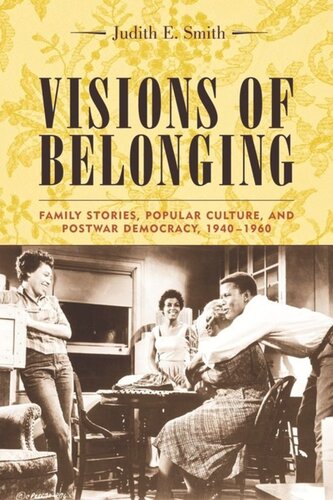

Most ebook files are in PDF format, so you can easily read them using various software such as Foxit Reader or directly on the Google Chrome browser.
Some ebook files are released by publishers in other formats such as .awz, .mobi, .epub, .fb2, etc. You may need to install specific software to read these formats on mobile/PC, such as Calibre.
Please read the tutorial at this link: https://ebookbell.com/faq
We offer FREE conversion to the popular formats you request; however, this may take some time. Therefore, right after payment, please email us, and we will try to provide the service as quickly as possible.
For some exceptional file formats or broken links (if any), please refrain from opening any disputes. Instead, email us first, and we will try to assist within a maximum of 6 hours.
EbookBell Team

4.7
26 reviewsVisions of Belonging explores how A Tree Grows in Brooklyn, I Remember Mama, Gentleman's Agreement, Death of a Salesman, Marty, and A Raisin in the Sun helped define visions of belonging in America in the postwar years and into the 1950s. Judith E. Smith traces the cultural trajectory of these family stories as they circulated widely in bestselling paperbacks, hit movies, and popular drama on stage, radio, and television. She draws on the testimony of authors, directors, readers, and viewers from both sides of the color line to reveal divergent, emotionally textured, and politically charged social visions. Their diverse perspectives provide unusually close access to a vibrant conversation about the boundaries between public life and family matters and the meanings of race and ethnicity. They also reacquaint the reader with a time in which the possibilities for social transformation seemed boundless but actual change was fiercely resisted. Smith crosses disciplinary boundaries by probing the social history of literary, dramatic, and cinematic texts. Her innovative use of archival research sets authorial intent next to audience reception and shows how both contribute to contested conceptions of American belonging.
Visions of Belonging explores how beloved and still-remembered family stories—A Tree Grows in Brooklyn, I Remember Mama, Gentleman's Agreement, Death of a Salesman, Marty, and A Raisin in the Sun—entered the popular imagination and shaped collective dreams in the postwar years and into the 1950s. These stories helped define widely shared conceptions of who counted as representative Americans and who could be recognized as belonging.
The book listens in as white and black authors and directors, readers and viewers reveal divergent, emotionally textured, and politically charged social visions. Their diverse perspectives provide a point of entry into an extraordinary time when the possibilities for social transformation seemed boundless. But changes were also fiercely contested, especially as the war's culture of unity receded in the resurgence of cold war anticommunism, and demands for racial equality were met with intensifying white resistance. Judith E. Smith traces the cultural trajectory of these family stories, as they circulated widely in bestselling paperbacks, hit movies, and popular drama on stage, radio, and television.
Visions of Belonging provides unusually close access to a vibrant conversation among white and black Americans about the boundaries between public life and family matters and the meanings of race and ethnicity. Would the new appearance of white working class ethnic characters expand Americans'understanding of democracy? Would these stories challenge the color line? How could these stories simultaneously show that black families belonged to the larger "family" of the nation while also representing the forms of danger and discriminations that excluded them from full citizenship? In the 1940s, war-driven challenges to racial and ethnic borderlines encouraged hesitant trespass against older notions of "normal." But by the end of the 1950s, the cold war cultural atmosphere discouraged probing of racial and social inequality and ultimately turned family stories into a comforting retreat from politics.
The book crosses disciplinary boundaries, suggesting a novel method for cultural history by probing the social history of literary, dramatic, and cinematic texts. Smith's innovative use of archival research sets authorial intent next to audience reception to show how both contribute to shaping the contested meanings of American belonging.